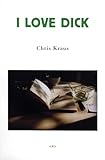 This book is a lot smarter than I am. It’s a lot smarter than most of us. And yet smart really isn’t the word I want to describe the thing—this memoir or novel, who cares what it is—so much as dismantling. Dismantling of its author and anyone who decides to pick through what feelings come loose. I Love Dick is a chrestomathy of experience that schools us in abjection and desire. It’s about the filmmaker Chris Kraus and her husband, Sylvère Lotringer, who, together and apart, fall into an unrequited threesome with the eponymous Dick after one dinner with him at a sushi bar in Pasadena. Unrequited insofar as Dick becomes an off-scene repository for the stuff of Chris and Sylvère’s marriage (they write him letters) and, later, for the stuff of Chris—what she talks about when she talks about love. There is art, genocide, schizophrenia; there is Simone Weil, Flaubert, activist Jennifer Harbury, and artist R.B. Kitaj. The book is full of allusion—“Does analogy make emotion less sincere?” No!—and adventures in form (180 pages of letters—some from Chris, some from Sylvère, some from both—alongside third-person interludes) that make this one of the messiest, most honest, and epic revelations of self out there.
This book is a lot smarter than I am. It’s a lot smarter than most of us. And yet smart really isn’t the word I want to describe the thing—this memoir or novel, who cares what it is—so much as dismantling. Dismantling of its author and anyone who decides to pick through what feelings come loose. I Love Dick is a chrestomathy of experience that schools us in abjection and desire. It’s about the filmmaker Chris Kraus and her husband, Sylvère Lotringer, who, together and apart, fall into an unrequited threesome with the eponymous Dick after one dinner with him at a sushi bar in Pasadena. Unrequited insofar as Dick becomes an off-scene repository for the stuff of Chris and Sylvère’s marriage (they write him letters) and, later, for the stuff of Chris—what she talks about when she talks about love. There is art, genocide, schizophrenia; there is Simone Weil, Flaubert, activist Jennifer Harbury, and artist R.B. Kitaj. The book is full of allusion—“Does analogy make emotion less sincere?” No!—and adventures in form (180 pages of letters—some from Chris, some from Sylvère, some from both—alongside third-person interludes) that make this one of the messiest, most honest, and epic revelations of self out there.
Eileen Myles, in her forward to my edition, calls I Love Dick a cunty exegesis (now there’s a phrase that rolls off the tongue), and though the book is absolutely engaged with the subject of female desire, I think it’s more about the psychic experience of failure—its appeal and fallout. As Kraus writes, “If art’s a seismographic project, when that project meets with failure, failure must become a subject, too. Dear Dick, That’s what I realized when I fell in love with you.” And what I realize whenever I think about what seems so disappointing apropos form in contemporary literature, apropos its sense of order and through-line and ease of consumption, which is its disregard for failure as one of the most—if not the most—vital and inevitable experiences of being alive. To be honest about failure, to make of its role a case study, is always going to be a messy affair. Kraus quotes the poet David Rattray—“Honesty of this order threatens order”—and, if you push it far enough, as Kraus does, it turns form away from order and towards an intermingling of the raw, the troubling, the ecstatic.
More from a Year in Reading 2010
Don’t miss: A Year in Reading 2009, 2008, 2007, 2006, 2005
The good stuff: The Millions’ Notable articles
The motherlode: The Millions’ Books and Reviews
Like what you see? Learn about 5 insanely easy ways to Support The Millions










